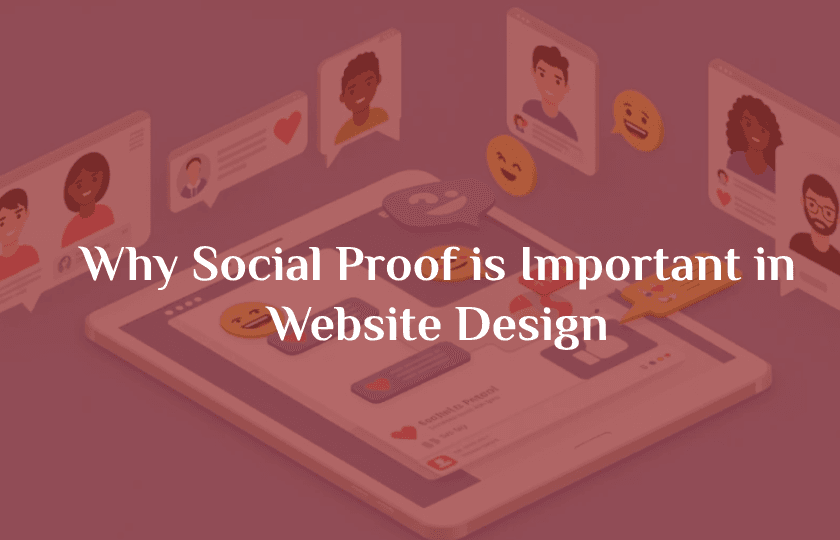In today’s digital age, consumers are increasingly turning to the internet to make decisions about the products, services, or brands they engage with. Whether it’s choosing where to shop, what to buy, or which services to invest in, people are more likely to trust social proof than a brand’s own claims. Social proof plays a critical role in website design because it influences user trust, credibility, and ultimately conversion rates. If you want to make your website stand out and drive more conversions, understanding and leveraging the power of social proof is essential.
In this article, we’ll explore why social proof is so crucial for your website design and how to implement it in a way that boosts your site’s credibility, builds trust, and leads to better business outcomes.
What is Social Proof?
Social proof is a psychological phenomenon where people look to the actions and behaviors of others to determine what is right or acceptable in a given situation. It’s often referred to as the “herd mentality” — when individuals decide to follow the actions of a group rather than making independent decisions.
In website design, social proof involves showcasing evidence that other people have positively interacted with your brand. This could come in the form of customer reviews, testimonials, user-generated content, case studies, social media mentions, and even the number of customers or followers.
By incorporating social proof into your website, you’re signaling to visitors that your brand is trustworthy and popular, making them more likely to engage with your site and make a purchase or take another action.
1. Social Proof Builds Trust
Trust is one of the most critical factors in driving conversions on your website. If visitors don’t trust your website or your products, they’re unlikely to complete a purchase, subscribe to your newsletter, or take any other desired action.
Social proof works by reinforcing credibility and reducing the uncertainty that potential customers feel when they’re unsure about a product or service. When users see that others have had positive experiences with your brand, they are more likely to trust you and feel confident in their decision to engage with your site.
Example:
Customer Reviews and Testimonials: When potential customers see positive reviews from others who have already used your product or service, it provides social validation. Customers are more likely to trust your brand when they see others vouching for it.
2. Social Proof Enhances Credibility
Having credible sources supporting your product, service, or brand can dramatically improve your website’s reputation. Social proof can be used to elevate your business credibility, especially if you leverage high-profile endorsements or associations with well-known brands.
When users see that your website has been endorsed by influencers, trusted publications, or industry experts, it sends a signal that your brand is legitimate, professional, and worth their attention.
Types of Social Proof That Build Credibility:
Industry Awards or Certifications: Displaying awards or certifications from reputable organizations builds authority and trust.
Press Mentions or Media Coverage: Featuring logos of credible news outlets or industry publications that have mentioned or featured your brand reinforces trustworthiness.
Influencer Endorsements: If influencers or well-known figures endorse your product, their authority and following can translate into higher credibility for your brand.

3. Social Proof Increases Conversion Rates
Social proof has been shown to directly influence conversion rates — the percentage of website visitors who complete a desired action, such as making a purchase, signing up for a newsletter, or filling out a contact form. By using social proof, you make it easier for visitors to make decisions by providing external validation.
Examples of Social Proof Impacting Conversions:
Customer Reviews: Websites with positive reviews tend to have higher conversion rates. Research shows that consumer reviews can increase conversions by 270% in some cases.
“Best Seller” Labels: Many e-commerce websites highlight best-selling products to encourage visitors to purchase what others are already buying. This creates a sense of urgency and suggests that others have found value in the product.
Live Notifications: Some websites display real-time data, such as showing how many people are currently viewing a product or how many purchases have been made recently. This reinforces the idea that your products are in demand.
4. Social Proof Reduces Purchase Anxiety
For many people, making a purchase — especially an online one — can come with some level of anxiety. Will the product meet their expectations? Will it work as described? Will they regret their purchase?
Social proof is an excellent way to alleviate these concerns. By seeing others endorse or validate your product, visitors are reassured that the product or service works as expected and provides value. This helps ease anxiety and can ultimately lead to a faster buying decision.
Examples:
Customer Testimonials: When you feature authentic customer stories on your website, it paints a clear picture of the benefits that others have experienced.
Before-and-After Photos: Displaying before-and-after photos (especially for products like beauty or fitness items) provides tangible evidence of how your product has helped others achieve results.
5. Social Proof Provides Validation and Social Status
Humans are social creatures, and we often make decisions based on the perceived approval or validation of others. This is especially true in the consumer purchasing process, where people want to buy products or services that are popular and well-regarded by their peers.
When people see that others have purchased, endorsed, or used a product, it provides social validation. In some cases, it can even lead to a sense of social status for the individual buyer.
Example:
Celebrity Endorsements: A product endorsed by a well-known celebrity not only builds credibility but also offers a form of status to the buyer. People are often drawn to products that give them a sense of belonging to an exclusive group.
6. Different Types of Social Proof to Use in Website Design
There are several ways to implement social proof into your website design. Choosing the right type for your business can depend on the nature of your industry, the size of your audience, and the goals you want to achieve. Below are the most effective types of social proof for websites:
Types of Social Proof:
Customer Reviews and Testimonials: Feature customer reviews prominently on product pages, landing pages, or your homepage. Use platforms like Google Reviews, Yelp, or Trustpilot to embed customer reviews on your site.
User-Generated Content (UGC): Show images or videos from real customers using your product, often referred to as UGC. For example, brands like Instagram or GoPro use UGC to showcase real-life use cases.
Social Media Mentions: Display social media posts that mention your brand or product. If people are talking about your brand online, it’s a great way to show real-world validation.
Case Studies and Success Stories: Share detailed case studies that highlight how your product or service solved a problem or brought success to customers. Include measurable results if possible.
Trust Badges: Display trust badges or security seals (such as SSL certificates, payment security, or industry certifications) to increase consumer confidence in making transactions on your site.
Influencer Endorsements: If applicable, feature influencers who have used and recommended your product, as they bring additional credibility and social following to your brand.

7. Best Practices for Integrating Social Proof into Website Design
When adding social proof to your website, it’s important to integrate it in a way that feels authentic and natural. Overloading your site with too many reviews, testimonials, or badges can come off as disingenuous and harm the user experience.
Tips for Effective Integration:
Place Social Proof Strategically: Display social proof where it’s most likely to influence decision-making, such as on product pages, checkout pages, or after a lead generation form.
Use High-Quality, Authentic Reviews: Avoid generic or overly promotional reviews. Focus on those that provide meaningful, specific details about your product or service.
Keep it Simple: Use a clean design that integrates social proof without overwhelming your visitors. The goal is to subtly build trust without distracting from the core message.
Highlight Key Metrics: If you have notable metrics like “5,000+ satisfied customers” or “Rated 4.8/5 by over 1,000 users,” make those numbers stand out to grab visitors’ attention.
Conclusion:
The Power of Social Proof in Website Design
Incorporating social proof into your website design is not just a trend — it’s a proven strategy that can significantly enhance trust, boost credibility, and improve conversion rates. By leveraging positive feedback from your existing customers, showcasing social media buzz, and displaying trust signals, you can influence potential customers and make them more likely to engage with your brand.
Remember that in the competitive world of e-commerce and online business, trust is essential. Social proof acts as a form of digital word-of-mouth, which is one of the most powerful ways to convert visitors into loyal customers.
If you want your website to succeed, start integrating social proof into your design today, and watch how it positively impacts your conversions and business growth.



